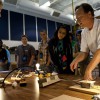 STEM is an acronym for science, technology, engineering, and math. In Extension, our purpose is to share the knowledge or products created through Ag-STEM research and design by universities and government agencies. Finding effective solutions to agricultural issues, especially in urban areas, increasingly involves working with clientele to solve problems jointly. Therefore, emphasizing the connections of STEM to agricultural problems through Ag-Extension programming can help our public audiences comprehend the problem-solving system underlying the content. The goal is to provide public audiences with self-confidence and skills in STEM, preparing them to be more engaged in the problem-solving process for the challenges ahead. This 5-page fact sheet was written by Kathryn A. Stofer, Laura A. Warner, and Steven Arthurs, and published by the UF Department of Agricultural Education and Communication, October 2014. (UF/IFAS photo by Tyler Jones.)
STEM is an acronym for science, technology, engineering, and math. In Extension, our purpose is to share the knowledge or products created through Ag-STEM research and design by universities and government agencies. Finding effective solutions to agricultural issues, especially in urban areas, increasingly involves working with clientele to solve problems jointly. Therefore, emphasizing the connections of STEM to agricultural problems through Ag-Extension programming can help our public audiences comprehend the problem-solving system underlying the content. The goal is to provide public audiences with self-confidence and skills in STEM, preparing them to be more engaged in the problem-solving process for the challenges ahead. This 5-page fact sheet was written by Kathryn A. Stofer, Laura A. Warner, and Steven Arthurs, and published by the UF Department of Agricultural Education and Communication, October 2014. (UF/IFAS photo by Tyler Jones.)
http://edis.ifas.ufl.edu/wc184
Tag: Adult Education
Increasing Efficiency in Extension Using the Train-the-Trainer Approach
 Extension has adapted to today’s financial realities through a number of strategies, including increased reliance on partnerships. One strategy that expands the reach of an Extension agent and capitalizes on partners is the “train-the-trainer” approach.This 4-page fact sheet describes the train-the-trainer approach as it applies to Extension programming, provides contextual examples from within and beyond UF/IFAS Extension, and offers best management practices. Written by Laura A. Warner, Amy Harder, Tom Wichman, and Frank Dowdle, and published by the UF Department of Agricultural Education and Communication, September 2014.
Extension has adapted to today’s financial realities through a number of strategies, including increased reliance on partnerships. One strategy that expands the reach of an Extension agent and capitalizes on partners is the “train-the-trainer” approach.This 4-page fact sheet describes the train-the-trainer approach as it applies to Extension programming, provides contextual examples from within and beyond UF/IFAS Extension, and offers best management practices. Written by Laura A. Warner, Amy Harder, Tom Wichman, and Frank Dowdle, and published by the UF Department of Agricultural Education and Communication, September 2014.
http://edis.ifas.ufl.edu/wc170
FCS-2287/FY1057 Should You Go Back to School? A Guide for Women
FCS=2287, a 4-page fact sheet by Lynn Max and Heidi Liss Radunovich, discusses issues surrounding returning to school in a question-and-answer format — advantages and disadvantages, how to pay for it, and factors contributing to success. Includes references. Published by the Uf Department of Family Youth and Community Sciences, August 2008.
http://edis.ifas.ufl.edu/FY1057